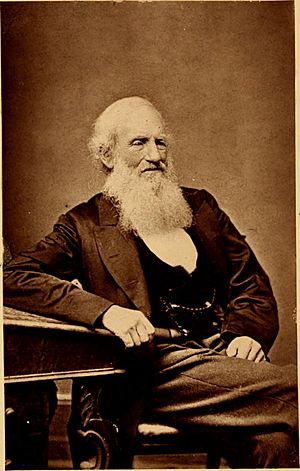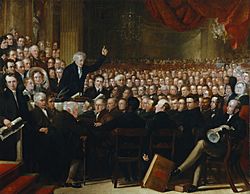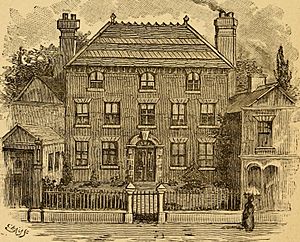Richard Allen (abolitionist) facts for kids
Quick facts for kids
Richard Allen
|
|
|---|---|

Allen pictured in his biography
|
|
| Born | 1803 Harolds Cross
|
| Died | 1886 |
| Nationality | British |
| Known for | Abolitionist |
| Spouse(s) | Ann (born Webb) |
Richard Allen (1803–1886) was an important person from Dublin, Ireland. He was a draper, which means he sold cloth and fabric. He was also a philanthropist, someone who helps others, and an abolitionist, meaning he worked to end slavery.
Richard Allen helped people during the terrible Irish Famine. He wrote many letters to America. These letters helped raise a lot of money, about £20,000, to support those suffering.
Contents
Richard Allen's Early Life
Richard Allen was born in 1803 near Dublin, in a place called Harold's Cross. His parents were Edward and Ellen Allen. He was one of many children in his family.
Richard was a Quaker, a member of a Christian group known for its peaceful beliefs and social activism. While he ran a business selling textiles, he was most interested in making the world a better place. He wanted to see reforms in society, promote temperance (avoiding alcohol), and end slavery. In 1828, he married Ann Webb.
Fighting Against Slavery
In 1837, Richard Allen helped start a group called the Hibernian Antislavery Association. He founded this group with two friends, James Haughton and Richard Davis Webb. This group became very active in fighting against slavery in Ireland. Richard Allen worked as the secretary for this association.
Richard Allen also started a publication called the Irish Temperance and Literary Gazette. He used this magazine to share his ideas. He also used it to promote the goals of the Anti-Slavery Association.
People in Ireland had been against slavery for a long time. Many Protestants, like Methodists, Quakers, and Unitarians, were strong supporters of the anti-slavery movement. Meetings were often held in their churches. A famous Irish leader named Daniel O’Connell also spoke out against slavery.
In 1840, Richard Allen was recognized for his work. His picture was included in a painting of the 1840 World Anti-Slavery Convention in London. This was a big meeting where people from all over the world gathered to discuss ending slavery.
Promoting Temperance
In 1846, Richard Allen went to another big meeting in London. This time, the topic was temperance. Richard Allen was one of the speakers at this convention. He talked about how he had visited a prison in Dublin. He noticed that parts of the prison were becoming empty. He believed this was because more people were choosing to avoid alcohol.
Helping During the Famine
The Great Famine caused terrible hardship in Ireland. In 1847, Richard Allen wrote letters to people in America. He explained how much the Irish people were suffering. An American abolitionist named William Lloyd Garrison said that Allen's letters made a big difference. He estimated that about £20,000 was raised to help the famine victims. This shows how powerful Richard Allen's words were.
 | James Van Der Zee |
 | Alma Thomas |
 | Ellis Wilson |
 | Margaret Taylor-Burroughs |



